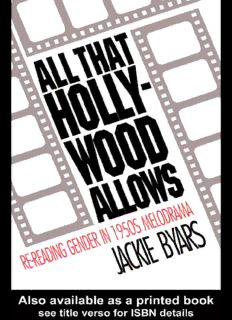
All That Hollywood Allows: Rereading Gender in 1950's Melodrama (Gender and American Culture) PDF
Preview All That Hollywood Allows: Rereading Gender in 1950's Melodrama (Gender and American Culture)
All That Hollywood Allows Jackie Byars All That Hollywood Allows Re-reading Gender in 1950s Melodrama Routledge London © 1991 The University of North Carolina Press All rights reserved First published in Britain in 1991 by Routledge II New Fetter Lane London EC4P 4EE This edition published in the Taylor & Francis e-Library, 2005. “To purchase your own copy of this or any of Taylor & Francis or Routledge's collection of thousands of eBooks please go to www.eBookstore.tandf.co.uk.” British Library Cataloguing in Publication Data available on request The paper in this book meets the guidelines for permanence and durability of the Committee on Production Guidelines for Book Longevity of the Council on Library Resources. Manufactured in the United States of America ISBN 0-203-39738-X Master e-book ISBN ISBN 0-203-39768-1 (Adobe e-Reader Format) ISBN 0-415-07116-X (Print Edition) ISBN 0-415-07117 8 pbk. TO CARL Contents Acknowledgments, viii Introduction Saying What Can’t Be Said, Reading What Must Be 1 Read: Feminist Criticism, Melodrama, and Film Studies, Chapter Cultural Studies: An Alternative for Feminist Film Studies, 18 One Chapter Re-reading Sociological Criticism: Roles, Stereotypes, and Popular 48 Two Film Melodramas of the Early 1950s, Chapter Re-reading Narrative Structure and Gender: The “Social Problem” 77 Three Film in the 1950s, Chapterzvviii Re-reading Psychoanalysis for Feminist Film Studies: The “Family 95 Four Romance” and “the Gaze” in Female-Oriented Film Melodramas of the 1950s, Chapter Race, Class, and Gender: Film Melodramas of the Late 1950s, 164 Five Epilogue Reflections, 202 Notes, 207 Bibliography, 230 Filmography, 242 Index, 256 Acknowledgments Rituals survive because they continue to be personally and socially valuable; the practice of acknowledging and thanking those people important to the development of a book project remains common because it allows us to express gratitude in a public and formal way that admits to the ultimately collaborative process of intellectual labor. There are many people I want to thank for various kinds of help I received as I developed this book. First, I would like to thank a few people who have been especially important to me, personally and intellectually, over the past few years, the period during which I wrote and rewrote this book. I have been privileged to share both ideas and good times with each of them, and to each of them I owe a great debt: Mary Layoun, Alda Blanco, Janice Radway, and Horace Newcomb. Several people read early versions of this book and gave me invaluable intellectual, political, and personal help during the course of my early formulations, for which they have my gratitude. They are Jim Kinneavy, Doug Kellner, Horace Newcomb, Tom Schatz, and Gayatri Spivak. Other friends were particularly helpful and supportive during that period and have remained so; I want to thank Ellen Draper, Pat Singleton, and Kay Sloan. I spent a year as an Andrew W. Mellon Postdoctoral Fellow at Bryn Mawr College, for which I particularly thank former Dean of Graduate Studies Barbara Kreutz; that time allowed me to reconceptualize the direction of my manuscript. My students at Bryn Mawr, especially Amy Villarejo, deserve credit for allowing me to think through my redirection as a part of their courses, as have my students in the Women’s Studies Program and in the Department of Communication Arts at the University of Wisconsin- Madison; I want to thank, particularly, Chad Dell, Ann Leighton, and Jane Shattuc, and my former colleagues Lynn Spigel and Tom Streeter. In addition, Christine Gledhill’s commentary on my work on melodrama was particularly reassuring at a time when my own faith was flagging. Similarly, Stuart Hall’s faith in and commentary on my work enabled me to continue working in the face of adversity. And the University of North Carolina Press’s conscientious readers offered rigorous critiques and suggestions that helped me to strengthen my arguments. I also am grateful to those who have actually helped in the research for and the production of this book. Barbara Humphries and Emily Sieger, of the Library of Congress, were particularly helpful during two different periods of intense research. Chad Dell helped prepare the first full computerized draft of my manuscript while remaining faithful, competent, and almost always cheerful. I thank my editors at the University of North Carolina Press—Iris Tillman Hill, Kate Torrey, Sandra Eisdorfer—and my copyeditor, D.Teddy Diggs, for their patience and for their attention to my manuscript. Finally, my husband, Carl Michel, and Carla PommertCherry—my student at Texas Christian University—gave generously of their time to help me through the final stages of preparing the manuscript. Our loved ones are usually the ones who most deserve gratitude for the patience with which they surround and support our intellectual labor. I want to express my gratitude to my parents, Charline and Jesse Byars, and my parents-in-law, Jean and Mike Michel, for believing in me, and to my husband, Carl Michel, for living with me and with this book project, because, in the words of David Letterman, “We all know how painful that can be.” I dedicate this book to him, with love. Finally, I thank this book project for pulling me back to where I want to be and for allowing me to articulate that locale.
Description: